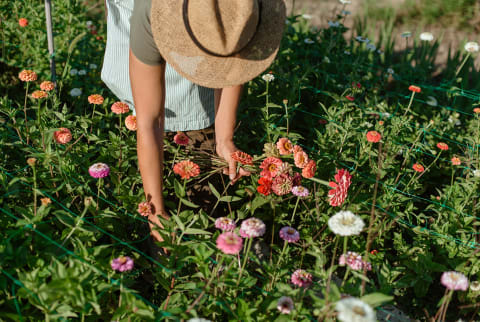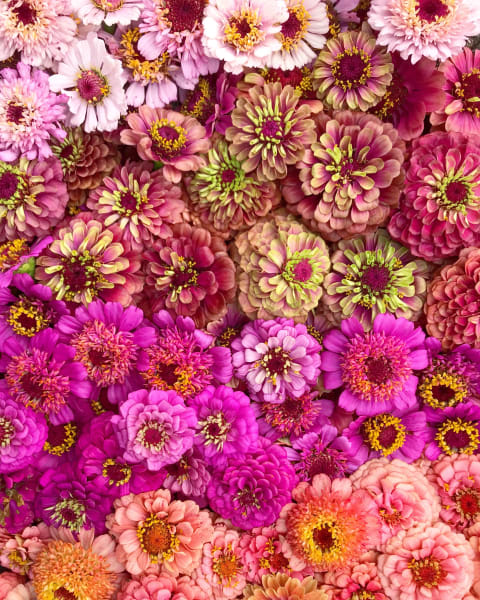Advertisement
New To Gardening? These Are The Best Plants To Start With


People worldwide turned to gardening as a workout for the body and an escape for the stressed mind.
"The ego is a gateway to anxiety, and gardening acts as a reminder of our role in the world—that we are not at the center of the universe but that we are all a part of something larger," Quentin Vennie, E-RYT 200, writes of how the activity helped calm his nerves during the throes of the pandemic.
Now that a new spring has come, people across the country are trying their green thumbs at planting yet again. If you're a beginner gardener looking to get into the rewarding practice this year, here are a few starter plants for the colorful, edible yard of your dreams.
Flowers for beginners.
Niki Irving, the founder of Flourish Flower Farm in Asheville, North Carolina, and author of the new book Growing Flowers, lists the following five blooms as her top picks for beginners looking to grow from seed:
"Those can all grow pretty much anywhere," Irving tells mbg. "They all love heat, so they could be started now for a summer garden."
Irving explains that these flowers are good for beginners because their larger seeds are more likely to bloom successfully: "They usually have high germination rates, which means that they sprout at a higher rate than other plants."
She adds that these flowers all play nicely with one another and would be happy to be planted side-by-side in a small garden plot. The best part? Their diverse shapes and colors make for a beautiful, balanced homemade bouquet when cut and arranged together.
Tips for growing them:

- Pick the right plot: All of these flowers need full sun (at least six hours of direct sunlight a day) and well-draining soil to thrive. They wouldn't do well in a shady patch of yard, or one that tends to puddle after it rains. Once you find a suitable plot of land for your garden, Irving says that starting small is the best move. "All these flowers can be planted really close together, 6 to 9 inches between each plant," she says. "And the closer you have them together, the less room there is for weeds to grow."
- Give them enough water: The ideal time to start a garden is right after the last frost in your climate. If you're planting later in the season when the sun is stronger, keep in mind that you'll need to water your plants more consistently. "They can be grown in containers as well," Irving adds. "Then, they will need a little more water because potted plants tend to dry out more quickly than those in the ground."
- Don't be afraid to cut them back: Once your seeds are in the ground, weather permitting, they should begin to sprout within a couple of days and flower 3 to 4 months later. Once you have flowers that are fully open, don't be afraid to snip a few to display in your home or gift to others. Doing so will actually help your flowers thrive: "The natural cycle of a plant is to flower, get pollinated, then start to go toward setting seed so it can repropagate the next year. But when you cut those flowers before they can go to seed, it keeps the plant in the blooming stage for longer," Irving explains. "You just don't want to take too many leaves," she caveats, "because those allow the plant to photosynthesize and keep growing."
- Stake plants as they grow taller: Irving says that supporting your flowers with netting, tomato cages, or bamboo stakes will help them grow straight and stay upright in windy summer storms.
- Spend some time in the garden every day: In addition to being a relaxing way to pass the time, Irving says that tending to your garden, observing new growth, and removing roots will make for happier plants.
Edible plants for beginners.
Craving some edible plants in your garden too? Here, Tata Hollins the founder of Black Women Who Love Plants, shares her top low-maintenance picks:
- Mint: Mint is very quick to grow from seed; it just needs enough space to thrive as it can easily overtake other plants in your garden. Give it a plot of its own, or put it in a container where its roots can run wild. (Here are some more top tips for growing herbs.)
- Tomatoes: "[Tomatoes] are the go-to veggie to start as a beginner gardener," Hollins says, since they don't require pruning, and, depending on the variety, they won't grow beyond a certain height. "Tomatoes only need warmth and light and a little watering throughout the week," she adds.
- Strawberries: Since strawberries have relatively lax water and sunlight needs, Hollins says they, too, make for an easy, tasty addition to a starter garden.
The bottom line.
While growing from seed can be daunting, starting with forgiving plants can help beginners get comfortable crafting a lush, productive garden.